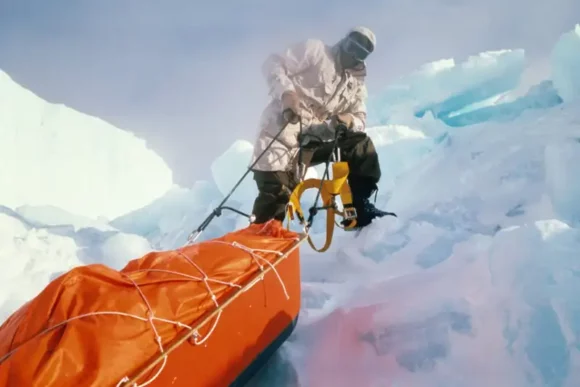Watching Explorer by Matthew Dyas for New Scientit, 3 August 2022
Explorer is a documentary about Ranulph Feinnes, the first man to circumnavigate the earth from Pole to Pole without recourse to flight.
It is a film full of ghosts. Its subject emerges slowly from snatches of previous documentaries, interviews, snatches of home movies, headlines. The film touts Feinnes’ unknowability: a risky strategy for audiences new to the man and his achievements, though the intrigue pays off handsomely in time.
Feinnes is not a man driven by mysterious and delicate internal forces. This is a man driven, simply and directly, by ghosts. Four months before his birth, Feinnes’s father was killed by a German landmine in Italy. His grandfather also died in the service of his country. It was young Ranulph’s intention to follow in their footsteps. Brought up in a household of indomitable women, he wanted to live up to the dad he never knew.
It was Feinnes’s first wife and former childhood sweetheart Ginny who devised the expedition that would make Feinnes a household name and make her the first woman to be awarded the Polar Medal. Seven years in the planning, Feinnes’s three-year Tranglobal expedition, from 1979 to 1982 was, with hindsight, the last of the great hero-projects of western expedition-making. The advent of satellite photography and instantaneous satellite communication has made much human adventure redundant, and undermined our old notions of physical heroism. In an era of extinctions and climate change, the notion of a human “pitting themselves against nature” has acquired a slightly “off” flavour.
Prevented by a stretch of open water from reaching the North Pole in 1984, Feinnes has long been one of our most eloquent witnesses to global warming. Nay-sayers will say there is something rotten at the heart of a white man’s exploration of what to him are far-off places. Feinnes’s expeditions since 1984 all point to something that should agitate us far more; that all over the world, the ice itself is rotting. The man lost fingers after hauling a sled out of polar water that shouldn’t have been water. Far from losing his already tenuous relevance, Feinnes is for many the ravaged poster child of our most contemporary crisis.
People who complain about Feinnes are rather like people who complain about us “mucking about in outer space”; they wildly over-estimate the costs involved, while wildly underestimating the value generated. Take the example of Transglobal: the expedition was put together from favours, donations and sponsorship. Careers were established in countless fields, from oceanography to biology to engineering, and 650 companies reaped the rewards of their association with the adventure.
Feinnes and his wife were unable to have children. When the couple applied to adopt a child, they were turned down because they didn’t have a stable enough income. Feinnes still struggles with money. Now a widower in his late seventies, remarried and father of one, he relies on plying the lecture circuit, driving sometimes ten hours a day to get from venue to venue, and sleeping in his car to avoid expensive bed-and-breakfasts.
Stomping through winter-time surf to ease the symptoms of suspected Parkinson’s disease, this old man is, by his own admission, still struggling to live up to his father. Pushing himself to the limit of his declining powers, he comes into focus at last as a tragic figure. But what is tragedy, if not a way of giving shape and meaning to a life that, by definition, is bound to end in decline and death?
Explorer’s achievement is to reach the source of Ranulph Feinnes’ heroism. The explorations, while staggering achievements, are mere way-stations. The goal is a life that has wrought as much good out of the world as it can.

